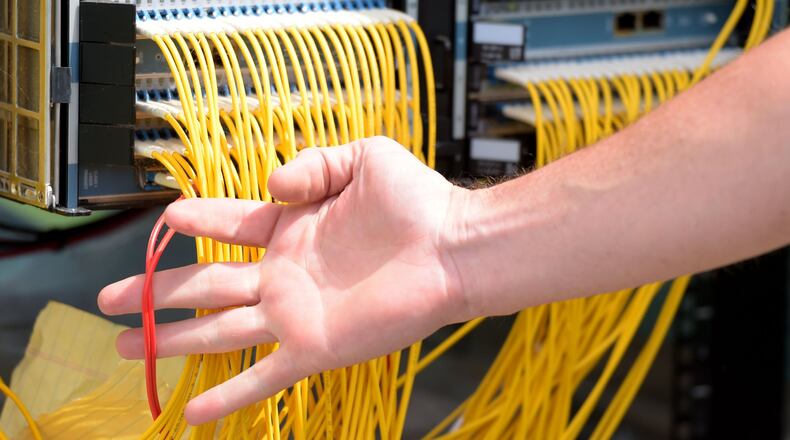No matter where you live in Georgia, internet speeds are almost certainly slower than the federal government says they are.
An analysis of Georgia speed test results by The Atlanta Journal-Constitution found that internet speeds were about one-fourth as fast as those reported by the Federal Communications Commission. Internet speeds averaged about 6.3 megabits per second in Georgia from June to December 2017, far below the FCC’s estimate of 25 megabits per second.
That means websites take longer to load, videos lag and customers aren’t getting the kind of high-speed internet they expect.
The AJC's review of speed tests, gathered from publicly available information provided by Google and its partners, shows the extent of internet deficiencies long before Georgia's government completes its effort to map online access at every location in the state. The state government mapping project, which is scheduled to be completed in about a year, will help determine where millions of dollars in potential tax money would be spent on expanding internet availability.
Downloads are especially slow in rural and some suburban areas, meaning there are likely hundreds of thousands more households lacking adequate internet than the 638,000 estimated by a University of Georgia report in 2017 that relied on federal data.
In Social Circle, a city of 4,500 people located about 45 miles east of Atlanta, residents said crawling internet delays their lives.
“I work from home, and it’s really slow. It takes a lot longer than it should,” said Sherry Sturgeon, a document specialist who uses the internet to research legal and property records. She said her internet provider told her husband it would cost $550 per month to run a business line to their home.
Charles Latt said his internet speeds are worse than advertised.
“It’s just slow, period,” Latt said as he dropped off mail at the Social Circle post office. “It isn’t high-speed internet like they say it is.”
Georgia's speed test results are in line with those reported nationwide, according to data gathered by Measurement Lab, an internet research group that includes Google, Code for Science & Society, New America's Open Technology Institute and Princeton University's PlanetLab.
Across the country, speeds reported by Measurement Lab show that real-life internet speeds fall short. FCC numbers say speeds averaged 25 megabits per seconds; speeds reported by Measurement Lab came in at 6.6 megabits per second.
The disparity between reported speeds and reality is caused by the way the FCC collects information.
Twice a year, internet service providers, such as AT&T and Comcast, report to the FCC the fastest speeds they serve to census blocks across the country. The federal agency then considers an entire area to be “served” by high-speed internet — with 25 megabit per second downloads and 3 megabit per second uploads — if any one location in a census block area has access to those speeds.
FCC maps of internet coverage areas are used to help decide federal funding for broadband service.
“We don’t actually know who has internet access and who doesn’t,” said Chris Mitchell of the Institute for Local Self-Reliance, a Minneapolis-based advocacy organization that focuses on banking, broadband, energy and waste conservation. “No one can really be sure because of this ambiguity in the census blocks. And if we fix that, we have a second major problem for policy, which is that we don’t know how much it costs” to expand internet service.
Georgia’s internet service mapping project will provide more details about where internet service is most needed, said Deana Perry, the state’s broadband director.
“Countless markets are routinely declared connected and competitive when they may not be,” Perry said. “The statewide map will be more granular.”
State legislators have said reliable internet service is essential to sustain businesses, students and hospitals in small towns that don't have fast connections. The Georgia General Assembly could consider tax subsidies for internet companies to build high-speed lines.
The state's mapping project will show where internet investment is most needed, providing a clearer picture than federal maps, said Stephen Loftin of the Georgia Cable Association.
“I think the FCC recognizes that they perhaps paint with too broad of a brush,” Loftin said. “To ensure those public dollars are going to the right places, that’s why we need these efforts both at the federal level and at the state level.”
The Georgia Cable Association’s members include Comcast, Charter Communications and Cox Communications, the cable and broadband internet subsidiary of Cox Enterprises, which also owns The Atlanta Journal-Constitution.
“It certainly can be misleading, especially if people are going to the map and looking to move to a new area and want to see what internet service providers are available,” said Eric Null, an attorney for the Open Technology Institute, a consumer advocacy organization that focuses on broadband access, net neutrality, cybersecurity and government surveillance.
Customers said they’re unconvinced that faster internet will arrive anytime soon, even if government funding arrives to help build it.
Charles Aston, a trucker who lives outside Social Circle, said his only option for home internet service is a 2 megabit-per-second line. That makes it harder for him to complete classwork for truck driver training courses.
“It slows everything down,” Aston said. “The only thing I could do is move.”
How we got the story
Using internet speed test data made available by Measurement Lab, Atlanta Journal-Constitution data specialist Nick Thieme calculated average internet speeds across Georgia. Measured speeds were gathered by Measurement Lab from 380,125 internet users who searched for their internet speeds using Google in the second half of 2017.
To get the average speed in a neighborhood in Atlanta, for example, an average speed was calculated for every IP address where the latitude and longitude of the IP address was inside the neighborhoood. IP addresses aren’t exactly unique users, but they’re a pretty good substitute.
Next, the IP averages were averaged together to find the total for the neighborhood. This prevented IP addresses that run many tests from biasing the neighborhood’s results. An analogous approach was used to calculate average speeds as reported by internet service providers to the Federal Communications Commission.
Keep Reading
The Latest
Featured



